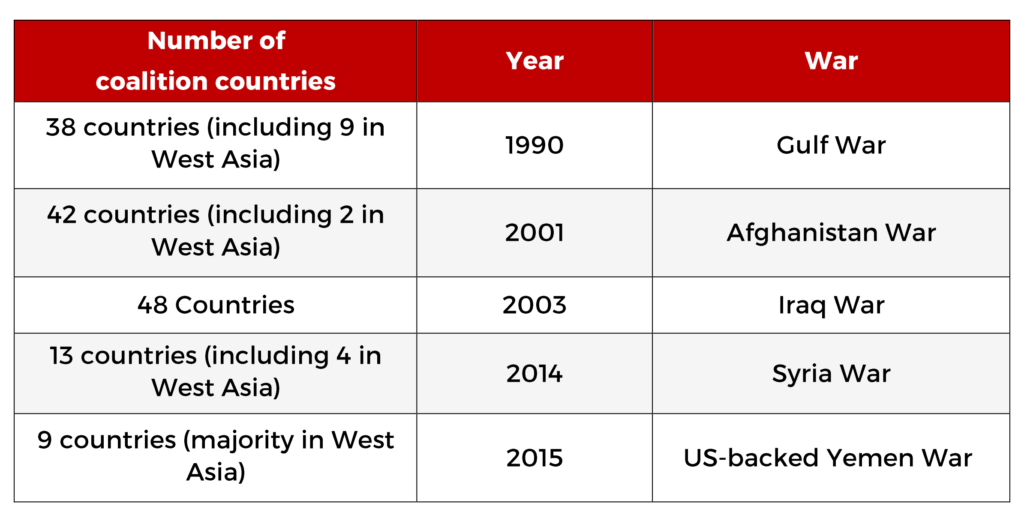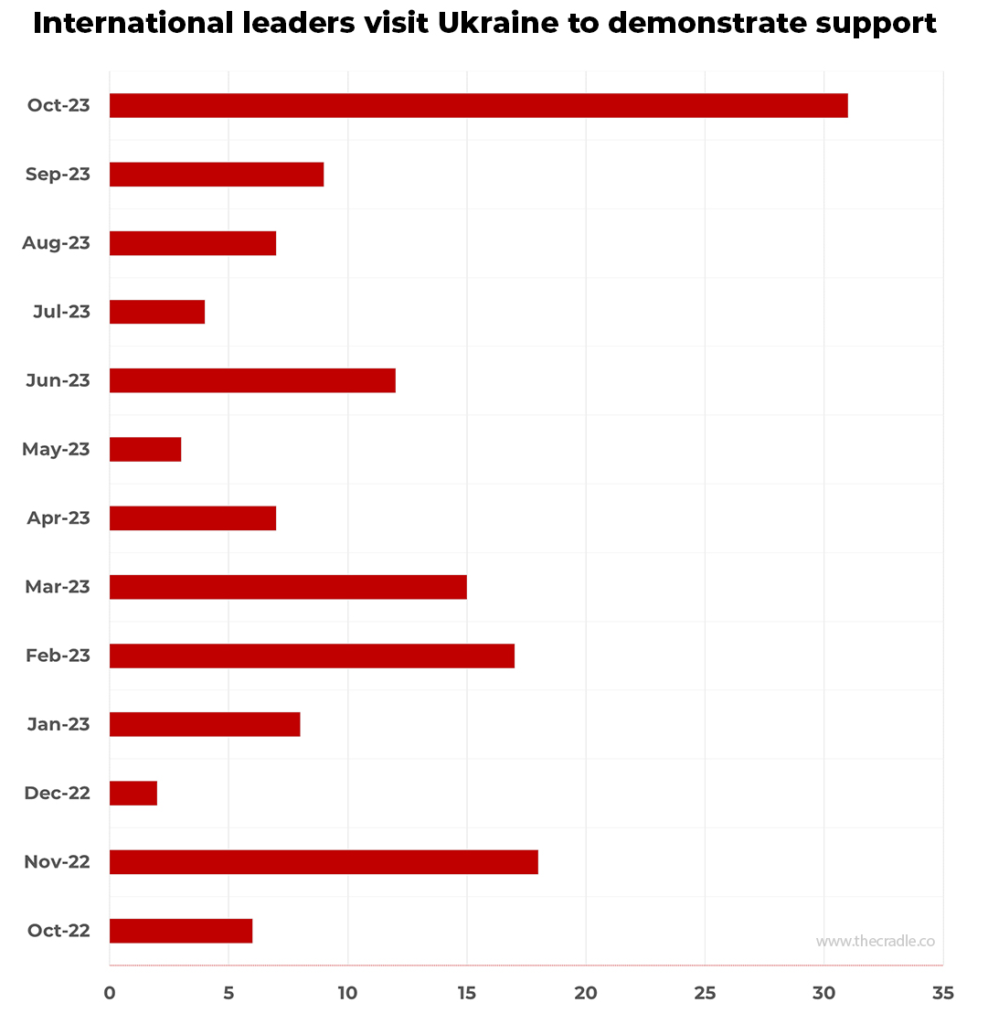While China-led multipolarity has accelerated the decline of the American era, the war in Gaza may end it altogether.
What is unfolding today in West Asia — the Gaza war and its regional expansion — cannot be viewed separately from the international transformations that have grown in momentum over the past few years. Today, the transition to multipolarity is the underlying factor shaping the decisions and policies of most countries, particularly those of the great powers.
The timing of Israel’s devastating military assault on Gaza coincides with heightened US attention on its great power competition for Washington, this conflict has much wider geopolitical significance beyond West Asia. In this context, the US has assumed, and will continue to play, a pivotal role in Gaza and its environs, unlike its powerful peers in China and Russia.
According to statistics published by the China Society for Human Rights Studies, the US initiated 201 of the 248 armed conflicts that took place since the end of World War II, often engaging in these wars via US-led alliances and/or proxies.

For decades, Washington has led these conflicts by very ably forming, then leading, and directing broad alliances to achieve its political and military objectives. But that ability notably shifted in December 2023, signaling a sharp decline in this capability.
In response to Yemen’s Ansarallah-aligned armed forces’ Red Sea blockade of Israeli-linked vessels, the US Department of Defense announced the formation of “Operation Guardian of Prosperity … to uphold the foundational principle of freedom of navigation” in those waters, initially consisting of a coalition of ten countries, most of them insignificant partners.
Protecting Israel or maintaining maritime dominance?
The coalition proved shaky from the get-go, with only the US and Britain actively involved in military strikes on Yemen. The reluctance of key European countries France, Spain, and Italy to join the naval alliance indicated a growing skepticism among the US’s traditional partners — both western and West Asian — about Washington’s commitment and capability to defend its allies in any impactful way.
Interestingly, more than eight further countries reportedly joined the coalition, but demanded anonymity, given the potential political fallout from associating with Washington and Tel Aviv.
Crucially, the Pentagon’s stated purpose of securing navigation in the Red Sea does not align with the actual threat presented, revealing ulterior motives behind US actions. The Yemenis have repeatedly confirmed that they only intend to inhibit the passage of Israeli-owned or destined vessels — and that all other ships are free to pass.
In short, the US/UK-led coalition is acting as a naval arm for Israeli military forces, seeking specifically to ensure unimpeded access for ships heading to Israeli ports via the Bab al-Mandab Strait. That’s not a position many other states will get behind if they want to maintain freedom of transport for their own shipping vessels.
Ultimately, the American show of force in these waterways seeks to consolidate US naval dominance, which war-torn Yemen, West Asia’s poorest country, has contested.
As outlined in the National Security Strategy for 2022:
The US “will not allow foreign or regional powers to jeopardize freedom of navigation through the Middle East’s (West Asia) waterways, including the Strait of Hormuz and the Bab al Mandab, nor tolerate efforts by any country to dominate another — or the region — through military buildups, incursions, or threats.”
According to media reports following massive US airstrikes against Iraqi targets on 23 January, Iraqi resistance factions will now also follow Yemen’s suit by implementing a blockade of Israeli ports in the Mediterranean Sea.
Current events are spiraling out of Washington’s control as onlookers increasingly question the utility and competence of US naval leadership in the world’s important waterways. Equally, there is recognition that other formidable forces and states have emerged, challenging US control over key global straits. In the words of British politician and writer Walter Raleigh, “Who rules the seas rules the world.” Under Sanaa’s watch, the US no longer can claim rule over the Red Sea or even its adjacent waterways.
Great power competition amid the Gaza war
The current scenario in West Asia, particularly post-Al-Aqsa Flood and the Gaza war that followed, coincides with a shift in Washington’s focus toward competition with China and its proxy war against Russia in Ukraine. As outlined in the US intelligence community’s annual threat assessment last year, this transition has already affected strategic goals, leading to a sharp decline in western support, especially from the US, for Ukraine. The Biden administration faced challenges in securing Congressional approval for a new aid package for Kiev, which directly competed for dollars against Tel Aviv’s military campaign in Gaza.

Despite assurances from western leaders during visits to Ukraine in October, their statements came without tangible material support, leaving President Volodymyr Zelensky in the proverbial dust. Quite unexpectedly, China has emerged as a potential peacemaker in this European conflict, with Kiev openly requesting Beijing’s involvement in mediation talks, and the US itself open to Chinese mediation to mitigate the escalation in West Asia.

The Chinese are well aware that there are no simple, face-saving exits for the US from the Gaza war it has championed and that the conflict’s metamorphosis into a regional one mires the US deeper into West Asia — and away from the Asia-Pacific.
Although China seeks to increase its presence in West Asia, it is very careful not to bog itself down in the region’s many issues. But Washington’s request that Beijing use its influence to sway Iran from conflict escalation makes clear that the US is no longer “the biggest power” in the region.
Why Israel opposes multipolarity
Following Operation Al-Aqsa Flood, US financial and military support for Israel has reached a critical stage, presenting two options for Washington. The first involves imposing some control on Israeli actions, given that the war’s timing has been unfavorable to US strategic interests, particularly in a critical election year. The second option, favored by the Washington elite, is to continue its unwavering support to Tel Aviv, even at the risk of damage to its global image.
Sustained global outrage over the Gaza war, coupled with the landmark genocide case filed against Israel at the International Court of Justice (ICJ), shows that Washington’s ability to cover for Israel is diminishing rapidly. Again, this reflects the global shift in the balance of power toward multipolarity, which is marked by the widespread decline of American influence.
But the US support for the Gaza genocide has had dramatic domestic repercussions, too. Polls show a major shift in the attitudes of young Americans, especially university youth, who will make up the ranks of America’s future leaders.
A Harvard-Harris poll published on 17 January reveals that 46 percent of respondents aged 18-24 believe that Hamas’ actions on 7 October can be justified because of the injustice to which the Palestinians are subjected. The same poll shows that 43 percent of the same group support Hamas in this war, and that 57 percent believe that Israel is carrying out massacres in Gaza. The most staggering poll result of all, though, has to be the one in December (conducted by the same pollsters) in which 51 percent of young Americans believe a final solution to the Israeli-Palestinian conflict is for Israel to end and be given to Hamas and the Palestinians.
While Israel remains a direct US interest in West Asia, Washington’s commitment to Tel Aviv’s security has already become a growing burden and increasingly difficult to justify. As the region’s Axis of Resistance expands its battle with Israel on new, multiple frontlines, the US will need to reallocate ever-expanding resources and focus on matching its international rivals in further-flung geographies.
Ukraine was a test run compared to this Gaza war and the immense, direct toll it is taking on US alliances, domestic politics, and the American image globally. For Israel, this presents an existential crisis beyond measure, as Washington is forced to compete with other great powers, none of whom are ideologically driven to support Zionism as part of their foreign policies.
 Eurasia Press & News
Eurasia Press & News




